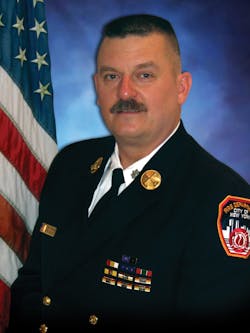At 36,000 feet, flying over the Ohio Valley on my way to take part in another Company Officer Academy with my teaching partner chief Rick Lasky, I was perplexed. Senator John McCain had just passed away, and I was reading a mix of articles in several newspapers about him.
Although I follow the news and politics fairly closely, I was learning more about this modern-day politician than I had ever heard before—paragraphs about his heroic and action-filled days in the Navy, interesting but not so complimentary revelations of his years in school as a young man, and even his hijinks at the Naval Academy. Most of it was simply inspirational! Why do we wait for some of the greatest among us to die before we celebrate their accomplishments and history?
I believe that we in the fire service make the same mistake. Many of us are working side by side with some of the most influential, highly trained, motivated firefighters and officers, and we don’t even know it: Firefighters who work part time at the county fire training center to prepare the next generation of firefighters for their rendezvous with the future. I have known members of the FDNY who turned down an overtime shift because they had a training class scheduled at the local fire academy back home that day. I know firefighters who can fix and/or build anything. Any tool on an apparatus that comes back to the firehouse after a fire and is broken is usually repaired and back on the rig before the shift is over.
There are firefighters and officers in departments around the country who have made some of the most dramatic rescues at different operations over the years and the younger firefighters who work with them every day don’t even know it. I was assigned to Squad 1 in Brooklyn as a lieutenant in 1993 when the first attack at the World Trade Center occurred. I was home that day and scheduled to work that night at the firehouse. After following that story all day as it unfolded, I went to work that afternoon. When I arrived, I briefly spoke with John Fox, the lieutenant who had worked that day. He mentioned briefly that they had worked at the incident, and then he gathered his belongings and went home. Not long after, I went down to the apparatus floor to start the night tour and learned that not only did they work at the incident, but that Lt. Fox had performed a dangerous and daring rope rescue of a firefighter who had fallen into the crater of the explosion at the hot and smoky scene. Unbelievable! And he didn’t even mention it to me when we talked at the shift change!
So what is it that results in firefighters and officers having these dramatic histories that nobody knows about? Humility? Yes, firefighters are known for not making a big deal out of their actions. After performing a rescue at a fire, a firefighter will often say they were just doing their job or that they were just one part of a great team effort.
Humility is admirable and nobody likes to hear a firefighter bragging about something they have done, but we in the fire service need to recognize that we are in the company of some of the best people alive. Firefighters are dedicated public servants who give and give and give. Often this giving comes with a cost, such as injury and hardship and even death.
This brings us to the title of this article, “Inspired by Death.” Why do we wait for one of us to pass away or die in the line of duty before we recognize the greatness around us? I’m not suggesting we start exaggerating or bragging about routine or even exciting acts that firefighters perform, but we should find the proper time and place to recognize greatness among us. And to make it even more meaningful, we should do it when the involved fire personnel are still with us. What’s another benefit of doing this? We can include the firefighters’ family—spouse, kids, maybe grandchildren, too.
Let’s celebrate the greatness of the American fire service, of the American firefighter, while they are still with us, rather than our family members discovering that their firefighter made a rescue, helped a fellow firefighter or made a difference to a neighborhood kid years ago and just never talked about it.
About the Author
John J. Salka Jr.
Battalion Chief
JOHN J. SALKA JR., who is a Firehouse contributing editor, retired as a battalion chief with FDNY, serving as commander of the 18th battalion in the Bronx. Salka has instructed at several FDNY training programs, including the department’s Probationary Firefighters School, Captains Management Program and Battalion Chiefs Command Course. He conducts training programs at national and local conferences and has been recognized for his firefighter survival course, “Get Out Alive.” Salka co-authored the FDNY Engine Company Operations manual and wrote the book "First In, Last Out–Leadership Lessons From the New York Fire Department." He also operates Fire Command Training, which is a New York-based fire service training and consulting firm.

